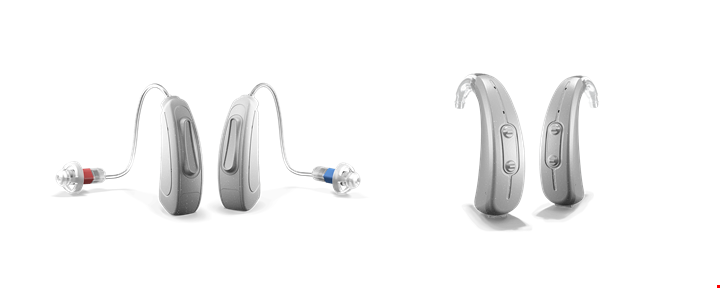Tinnitus: the causes of ringing in the ears
How does tinnitus develop?
Tinnitus
Public plague tinnitus: The causes can be varied, a common trigger is noise. Anyone who operates loud machinery, craftsman or musician, for example, in a particularly noisy environment over a long period of time has a high risk of developing tinnitus or even hearing loss later on. This is all the more true if the person does not wear adequate hearing protection while working. Constant noise accelerates the natural wear and tear of the hair cells in the inner ear.

Noise can damage hearing not only at work but also during leisure time: Loud music concerts, gardening with a chain saw or tinkering with motorcycles are just a few examples of possible causes of tinnitus. It is advisable to always wear hearing protection when noise levels are high. After spending time in a particularly noisy environment, your hearing should be allowed to recover as soon as possible in a quieter environment.
Sometimes tinnitus develops after a single, exceptionally high noise exposure such as an explosion or loud bang near the ear. This is known as a blast trauma.
Tinnitus can be a great burden for those affected. Cure is difficult, sometimes not possible. But there are ways to live with tinnitus, especially Tinnitus Retraining Therapy (TRT). You can read more about them here.
Subjective and objective tinnitus
The causes of tinnitus can also be diseases of the ear or the auditory pathway. A distinction is made between subjective tinnitus, which is only perceptible to the affected patient and cannot be measured, and the much rarer objective tinnitus, which is due to measurable disturbing noises in the body.
Objective tinnitus - the causes can be
- Flowing noises due to vascular malformations
- Hemangiomas (blood sponges or red birthmarks)
- soft palate nystagmus (neurological dysfunction of the larynx muscles)
- High blood pressure
- Tube dysfunction (disease of the Eustachian tube or auditory trumpet)
- Tumours in the middle ear
Possible triggers of subjective tinnitus:
- Sound trauma (noise trauma, blast trauma)
- Stress
- Hearing loss (hypoacusis)
- Inflammation of the ear (e.g. inflammation of the middle ear)
- Otosclerosis of the middle ear
- Meniere's disease (disease of the inner ear)
- Viral and bacterial infections (e.g. borreliosis)
- Autoimmune diseases of the inner ear
- Foreign bodies in the ear canal (e.g. earwax plugs)
- Acoustic neuroma (tumour of the auditory nerve)
- Craniomandibular dysfunction (muscular dysfunction of the jaw joints, often as a result of stress)
- Functional disorders of the cervical spine
- Decompression sickness in divers
- Variations in the amount of inner ear fluid (endolymph) due to congestion
- Muscular causes (Myofascial syndrome)
- Cardiovascular diseases
- Metabolic and kidney diseases
- diseases of the central nervous system
- medicines, for example high doses of acetylsalicylic acid, but also certain antibiotics, dehydration tablets and other
- Toxins, for example certain solvents and heavy metals, but also arsenic and carbon monoxide
- Blows to the head and skull injuries
For a long time it was assumed that subjective tinnitus develops in the inner ear. But this theory is contradicted by the fact that tinnitus usually persists even after the auditory nerve has been severed. In addition, imaging techniques show changes in nerve activity in different areas of the brain when tinnitus occurs: A disturbed balance between inhibitory and excitatory processes leads to an activation of the nerve cells in the areas of the brain involved in auditory perception without an actual source of noise being present. In this respect, subjective tinnitus can be compared with the development of phantom pain after amputation of limbs. Similar to phantom pain, tinnitus is in most cases triggered by an injury, for example by a blast trauma. However, the cause leading to the perception of the auditory noise lies in the brain.
Subjective tinnitus: the causes of the perception of a sound
The ear and brain work together in a complex way when processing auditory impressions: Sound waves travel through the ear canal, eardrum and middle ear to the inner ear. There, in the cochlea, auditory sensory cells convert the physical stimuli into electrical signals that are transmitted via the auditory nerve to the auditory centre in the brain (primary auditory cortex). Together with other areas of the brain, the responsible nerve networks decode the auditory impressions and classify them. Unnecessary stimuli are normally filtered out.
Even the slightest disturbance in the hearing system, for example in the auditory sensory cells, can disrupt this sophisticated chain of processing steps in such a way that auditory impressions become independent and settle in the brain independently of external stimuli. The nerve cells involved in hearing processing sometimes react in an overactive way in order to compensate for the hearing loss caused by the original disorder. This overactivity remains in some affected persons even after the disorder has been corrected: subjective tinnitus develops.
Rarely do sensory or nerve cells also become spontaneously active and provide the brain with incorrect sound information, even though the hearing is intact. This misinformation can also be the cause in the development of subjective tinnitus.
The pitch of the tinnitus depends on the location of the damage
The sensory cells are arranged in the cochlea of the inner ear in such a way that the cells in the front are responsible for the perception of high frequencies and those in the back for lower sounds. This special arrangement is called a tonotopic structure. Damage to the sensory cells can be the cause of tinnitus. It impairs hearing in the frequency range for which the affected cells are responsible. The respective sensory cells then transmit weaker signals from the inner ear to the primary auditory cortex in the brain. The tonotopic structure continues along the entire auditory pathway, up to the primary auditory cortex: this is also where the nerve cells for the different frequency ranges are arranged.
If the sensory cells are damaged, the unusually weak signals from the inner ear reach the nerve cells of the primary auditory cortex responsible for the affected frequency range. The brain reacts to this disturbance by reconnecting the connections between the affected nerve cells. If this reorganization leads to errors that impair the signal transmission between the nerve cells, the affected nerve cells react with chronic overactivity. For the patient, this becomes noticeable as subjective tinnitus.
Tinnitus: stress can trigger and amplify ringing in the ears
The psyche also plays an important role in the causes of tinnitus: what we hear triggers feelings - and conversely, our mood influences how we perceive sounds and noises. The extent to which tinnitus affects the life of the affected patient depends largely on his or her emotional evaluation of the ringing in the ears: anxiety, nervousness and stress can promote the development of tinnitus and increase the perception of ringing in the ears. Patients often report that the tinnitus first occurred in a psychologically stressful situation, for example, in the case of permanent stress or burnout. In this respect, stress is one of the causes of tinnitus.
Stress also massively increases the subjective burden of the tinnitus during the course of the illness. Tinnitus patients often suffer from sleep disorders, concentration difficulties and depressive syndromes. With the help of psychological questionnaires, specialists can record these impairments and determine the severity of the tinnitus.
A tinnitus can affect the affected person in almost all areas of life, up to a complete inability to work. Many tinnitus patients withdraw completely from social life. Their ringing in the ears makes it difficult for them to relax. They react increasingly irritated and the tinnitus makes it difficult for them to follow conversations. This can make it difficult for patients to find support in their environment or to establish new social contacts that could have a stabilising function for them.
Because of these far-reaching impairments for those affected, comprehensive treatment and advice from an ENT doctor and a hearing aid specialist are particularly important. This is the best way for tinnitus patients to find out how their condition can be treated and which aids can help.
The contributions provided on these Internet pages are intended exclusively for general information on topics relating to hearing acoustics and may not be used for the purpose of self-diagnosis. They are not intended to replace professional consultations, examinations and/or treatments by trained and recognized physicians and/or, if applicable, other experts working in the health care system and do not constitute recommendations or evaluations of diagnostic or therapeutic procedures. Please contact a doctor or expert if you have individual health questions or problems. We make every effort to research and present information as up-to-date and comprehensive as possible; however, we do not guarantee that the information is complete, correct and up-to-date, nor do we accept any liability for damages arising from the use of this information. Liability for the content of external links is excluded.
Discover other articles
- Smart Hearing: What intelligent hearing systems do
- The sooner an ENT specialist is consulted, the better
- Comfort to go: KINDvitalo
- Hearing loss and its causes
- Hearing aids while driving
- Optimized design for hearing solutions
- Meniere's disease
- Hearing test: Procedure and result
- Loud alone is not enough:
- Noise protection for the ears
